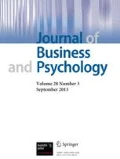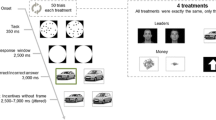Abstract
Eighty-six incumbents of three different jobs produced job-analytic ratings using either a decomposed (task-based) or a holistic (job-based) rating strategy. Approximately half of them received rater training in making inferential decisions. When tasks were less complex than the job as a whole, rating decomposition generally had positive effects on ratings' quality. Similarly, when the number of tasks rated was low to moderate, rater training was effective. A contingency approach, where limitations concerning the use of rating decomposition and inferential training were outlined, should serve to inform future uses and theories of rating aids in job analysis.
Similar content being viewed by others
References
Armstrong, J. S., Denniston, W. B., & Gordon, M. M. (1975). The use of the decomposition principle in making judgments.Organizational Behavior and Human Performance, 14, 257–263.
Arvey, R. D., Davis, G. A., McGowen, S. L., & Dipboye, R. L. (1982). Potential sources of bias in job analytic processes.Academy of Management Journal, 25, 618–629.
Butler, S. K., & Harvey, R. J. (1988). A comparison of holistic versus decomposed rating of Position Analysis Questionnaire work dimensions.Personnel Psychology, 41, 761–771.
Cornelius, E. T., & Lyness, K. S. (1980). A comparison of holistic and decomposed judgment strategies in job analysis by job incumbents.Journal of Applied Psychology, 65, 155–163.
Hicks, W. D., & Klimoski, R. J. (1987). Entry into training programs and its effects on training outcomes: A field experiment.Academy of Management Journal, 30, 542–552.
Holland, J. H., Holyoak, K. J., Nisbett, R. E., & Thagard, P. R. (1986).Induction. Processes of inference, learning, and discovery. Cambridge, Mass.: The MIT Press.
Landy, F. J., & Vasey, J. (1991). Job analysis: The composition of SME samples.Personnel Psychology, 44, 27–50.
Nisbett, R.E., & Ross, L. (1980).Human inference: Strategies and shortcomings of social judgment. New Jersey: Prentice-Hall.
O'Reilly, C. A., Parlette, G. N., & Bloom, J. R. (1980). Perceptual measures of job characteristics: The biasing effects of differing frames of reference and job attitudes.Academy of Management Journal, 23, 118–131.
Schmitt, N., & Cohen, S. A. (1989). Internal analysis of task ratings by job incumbents.Journal of Applied Psychology, 74, 96–104.
Sniezek, J. A., & Henry, R. A. (1989). Accuracy and confidence in group judgment.Organizational Behavior and Human Decision Processes, 43, 1–28.
Sulsky, L. M., & Balzer, W. K. (1988). Meaning and measurement of performance rating accuracy: Some methodological and theoretical concerns.Journal of Applied Psychology, 73, 497–505.
Thomas, J., & Griffin, R. (1983). The social information processing model of task design: A review of the literature.Academy of Management Review, 8, 672–682.
Tversky, A., & Kahneman, D. (1974). Judgment under uncertainty: Heuristics and biases.Science, 185, 1124–1131.
Uniform Guidelines on Employee Selection Procedures (1978).Federal Register, 1978,43, No. 166, 38290–38309.
U.S. Department of Labor, Manpower Administration (1972).Handbook for analyzing jobs. Washington, D.C.: U.S. Government Printing Office.
Author information
Authors and Affiliations
Additional information
We would like to acknowledge David Dorsey for his significant contribution to the rater training program. This article is a summary of the doctoral dissertation of Juan Sanchez, which was conducted under the supervision of Edward Levine.
Rights and permissions
About this article
Cite this article
Sanchez, J.I., Levine, E.L. The impact of raters' cognition on judgment accuracy: An extension to the job analysis domain. J Bus Psychol 9, 47–57 (1994). https://doi.org/10.1007/BF02230986
Issue Date:
DOI: https://doi.org/10.1007/BF02230986




